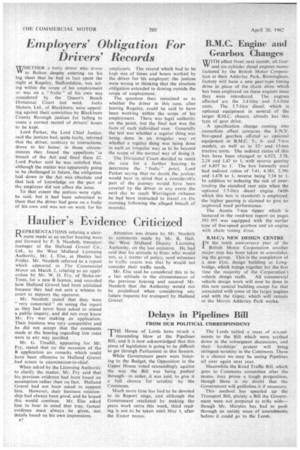Employers' Obligation For Drivers' Records
Page 36

If you've noticed an error in this article please click here to report it so we can fix it.
WHETHER a lorry driver who drove VV to Bolton despite entering on his log sheet that he had in fact spent the night at Rugeley, Staffordshire, was acting within the scope of his employment or was on a " frolic " of his own was considered by the Queen's Bench Divisional Court last week. Jacks Motors, Ltd., of Blackburn, were appealing against their conviction by Blackburn County Borough justices for failing to cause a correct record of drivers' hours to be kept.
Lord Parker, the Lord Chief Justice, said the justices had, quite fairly, inferred that the driver, contrary to instructions, drove to his home; in those circumstances they found the appellants ' in breach of the Act and fined them El Lord Parker said he was satisfied that, although the matter was apparently going to be challenged in future, the obligation laid down in the Act was absolute and that lack of knowledge on the part of the employer did not affect the issue.
To that extent the justices were right. he said, but it had been submitted to them that the driver had gone on a frolic of his own and was not on work for his
employers. The record which had to be kept was of times and hours worked by the driver for his employer; the justices were wrong in thinking that the absolute obligation extended to driving outside the scope of employment.
The question then remained as to whether the driver in this case, after leaving Rugeley, could be said to have been working within the scope of his employment. There was legal authority on the point, but the final test was the facts of each individual case. Generally the test was whether a regular thing was being done in an irregular way or. whether a regular thing was being done in such an irregular way as to be beyond the scope of the normal way of doing it.
The Divisional Court decided to remit the case for a further hearing to determine the " frolic " poirt, Lord Parker saying that no doubt the justices would bear in mind that a considerable part of the journey would have been covered by the driver in any event the neXt day to reach Warrington (whence he had been instructed to travel on the morning following the alleged breach of records).
















































































































